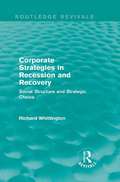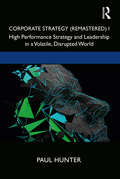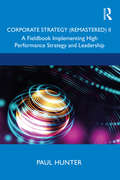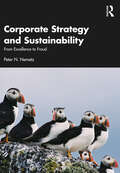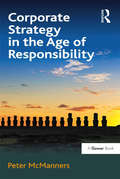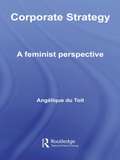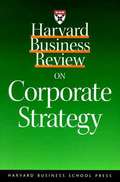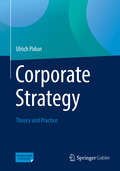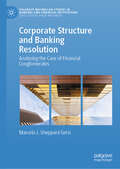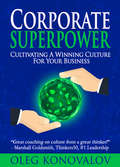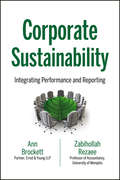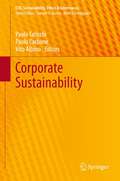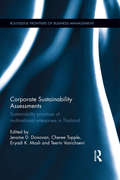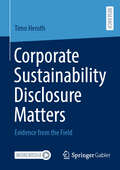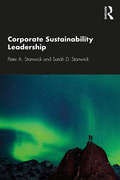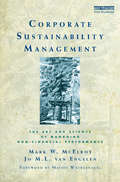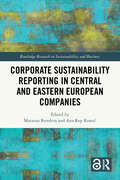- Table View
- List View
Corporate Strategies in Recession and Recovery: Social Structure and Strategic Choice (Routledge Revivals)
by Richard WhittingtonFirst published in 1989, this book is based on detailed comparative case studies of eight firms’ responses to the recession of the early 1980s, the worst crisis for British manufacturing in the post-war period. Following these companies’ progress from 1979 to 1985, Whittington examines the various recession strategies they adopted and the consequences of these for management change and financial performance in the recovery. Drawing on the Realist social theory of Roy Bhaskar, Whittington argues that the class, gender, generation and ethnicity of the decision-makers involved in the eight case studies collectively made an impact on their strategic choices. This is a timely and practical reissue, which will be of value to students, managers and academics concerned with strategic management, developments in organizational theory, and the current economic climate.
Corporate Strategy
by Phanish Puranam Puranam, Phanish and Vanneste, Bart Bart VannesteMany companies are not single businesses but a collection of businesses with one or more levels of corporate management. Written for managers, advisors and students aspiring to these roles, this book is a guide to decision-making in the domain of corporate strategy. It arms readers with research-based tools needed to make good corporate strategy decisions and to assess the soundness of the corporate strategy decisions of others. Readers will learn how to do the analysis for answering questions such as 'Should we pursue an alliance or an acquisition to grow?', 'How much should we integrate this acquisition?' and 'Should we divest this business?'. The book draws on the authors' wealth of research and teaching experience at INSEAD, London Business School and University College London. A range of learning aids, including easy-to-comprehend examples, decision templates and FAQs, are provided in the book and on a rich companion website.
Corporate Strategy (Remastered) I: High Performance Strategy and Leadership in a Volatile, Disrupted World
by Paul HunterSince 2000, more than half of the Fortune 500 companies have either gone bankrupt, been acquired, or are experiencing stagnation or decline as a result of extreme digital and social disruption. In recognition of this dilemma, Corporate Strategy (Remastered) was developed and designed to assist even the most experienced strategy practitioner tackle disruption and all aspects of change head on. This is the first book in the series; it provides a prescriptive solution to the way all approaches to strategy should be practiced. It embodies a context we refer to as Third Wave Strategy and its construct, a fully integrated Strategic Management Framework. The second volume is a fieldbook; it describes the methods and means to ensure successful implementation. An illustration of Third Wave Strategy in practice is reflected in a description of strategy deployed by the highly successful Amazon corporation. Many of the components of strategy that are included in the framework will already be familiar to the reader, while others are very new. Each of the individual components discussed are supported by examples drawn from real-life case studies. The overall value of the book is its representation of a fresh, holistic, dynamic and systemic approach to strategy in a format that, frankly, hasn’t existed before. In this book, readers are also introduced to many of the soft/human elements of strategy – the primary components that make it work. Examples of topics addressed include open strategy; communities of strategy practice; reframing; sponsive strategic thinking; systemic, cognitive strategy practice; organisational learning; and strategic business intelligence.
Corporate Strategy (Remastered) II: A Fieldbook Implementing High Performance Strategy and Leadership
by Paul HunterSince the onset of the Fourth Industrial Revolution numerous corporations have found that traditional ‘strategic planning’ is ineffectual in responding to, or capitalising on, unforeseen or unexpected change. In recognition of this and associated symptoms of inertia, bankruptcy or worse, this fieldbook was written for the purpose of guiding strategy practitioners through their intended or unintended journey into the future by providing meaningful strategy practices that enable responses to disruption and more importantly, better strategy practices overall. With a focus on strategy practice (‘doing’ strategy), this book represents a ‘how-to’ of Third Wave Strategy as defined in detail in the introductory book Corporate Strategy (Remastered) I. In addition to a description of methods that contribute to the philosophy of Third Wave Strategy, readers will witness the experiences of a virtual illustrative company that is travailing the same journey of organisational transformation and renewal that the methodologies described in this book also seek to address. The overall value of the book, therefore, is its ability to relate theory to practice in a factual and experiential format. A key part of the use of the virtual case study based on the illustrative Third Wave Industries (T-wI) Corporation is the blending of the system and process mechanisms that are a part of Third Wave Strategy and its framework, the strategy tools and techniques that are drawn from new and existing strategy practice and the soft issues that are represented by the human responses to change, as well as the management of change enacted in a corporate environment.
Corporate Strategy and Structure: Historical Perspective
by Robert S. Kaplan David P. NortonOrganizations have struggled for more than a century to find the ideal structures to manage their strategies. From Adam Smith's prototypical pin factory to the strategy-focused organization, this chapter provides an historical perspective on the evolution of the organization, illuminating how Balanced Scorecard innovation enables companies to design their operating systems to align structure with strategy.
Corporate Strategy and Sustainability: From Excellence to Fraud
by Peter N. NemetzCorporate Strategy and Sustainability is a substantially updated, detailed overview of sustainability issues for business and economics students. Built to teach the evolution of the history of sustainability practices, this edition has expanded coverage of social sustainability issues, non-Western perspectives and sustainable supply chains. Rich in cases, these too have been updated to demonstrate best practice and the practical application of theory. Extensive discussions of tools show how incorporate sustainability issues apply to strategic decision making. The book accentuates the value and importance of a strong sustainability approach in an age of climate change emergency. This textbook is an ideal companion to instructors and students of sustainability in business, economics and management.
Corporate Strategy at Berkshire Partners
by Julie M. Wulf Scott WaggonerThe managing directors of Berkshire Partners, a mid-sized private equity firm, address strategic and organizational challenges in response to turbulent market conditions, rapid firm growth, and the transition of leadership from its founding partners to the next generations. To address some of these dynamics, and to protect Berkshire's corporate advantage, the managing directors established three executive oversight committees, developed new specialized corporate functions, and incubated an internal hedge fund group. Students are given the opportunity to assess Berkshire's recent changes in corporate strategy and organizational design and to formulate recommendations going forward.
Corporate Strategy in the Age of Responsibility
by Peter McMannersAs the era of ever expanding markets and ample resources ends, governments and business will have to behave differently. The world is facing weak economic growth, limits to affordable resources and increasing concerns about environmental consequences. During the boom times, governments championed de-regulation and business responded by adopting an anything-goes attitude. In these straitened times, strategic analysis has to engage with the challenges that society faces to create resilient corporations fit for the 21st century. In Corporate Strategy in the Age of Responsibility, Peter McManners, who has for nine years run strategy workshops on the Henley MBA focusing on the global business environment, sets about providing a strategic framework for navigating the new economic environment. Chief Sustainability Officers (CSOs) now exist, but they struggle to find the strategic rationale for the improvements they champion. The author argues that their good intentions often lack traction, partly because others in management don’t get it, but also because they are not ambitious enough. The book is not about preaching semi-charitable behaviour or how to enhance the reputation of the corporation instead it is about surviving and thriving in a challenging and changing environment. A corporate audience familiar with strategy books will relate to this book, but will find it steers them towards radically new strategic thinking suitable for a turbulent period of transition.
Corporate Strategy: A Conceptual Framework
by David J. CollisProvides a conceptual framework for the study of corporate strategy. First describes previous perspectives on corporate strategy and then develops a framework of four elements: resources, tasks, structure, and industries. This framework can be used to explain the value corporations add to their businesses, how they should be organized, and the limit to the scope of the firm. Finally, describes four steps involved in the formulation of a corporate strategy.
Corporate Strategy: A Conceptual Framework
by David J. CollisProvides a conceptual framework for the study of corporate strategy. First describes previous perspectives on corporate strategy and then develops a framework of four elements: resources, tasks, structure, and industries. This framework can be used to explain the value corporations add to their businesses, how they should be organized, and the limit to the scope of the firm. Finally, describes four steps involved in the formulation of a corporate strategy.
Corporate Strategy: A Feminist Perspective (Routledge Research in Strategic Management)
by Angelique Du-ToitThis book takes a fresh look at corporate strategy, exploring it from a feminist perspective. Challenging male-dominated theory, Corporate Strategy looks at unquestioned assumptions held about strategy in practice and academia, including whether women approach strategy differently from men, and if so, how their approach differs? Reviewing the histories of strategy and feminism, the book explores the reasons why so few serious works on strategy have been written by women, and investigates the continued lack of women at senior levels within many organizations. Angélique du Toit draws on postmodern arguments to illustrate the claims made for the necessity of diversity within organizations, and challenges the fact that positions of power, both in society and organizations remain the exclusive right of men. Corporate Strategy argues that if an organization is to survive and succeed in the global economy, it has to pay more than lip service to issues surrounding diversity.
Corporate Strategy: The Quest for Parenting Advantage
by Marcus Alexander Andrew Campbell Michael GooldWhile the core competence concept appealed powerfully to companies disillusioned with diversification, it did not offer any practical guidelines for developing corporate-level strategy. To fill the gap, the authors propose the parenting framework, with tools for answering two questions: Which business should a company own? What parenting approach will get the best performance from those businesses? To determine the fit between a parent and its businesses, corporate strategists should look at four areas: the critical success factors of the business, the parenting opportunities in the business, the characteristics of the parent, and the financial results. Next, to determine which businesses to keep and which to divest, they should rank them into five categories: those that fit well; those that fit in some ways; those that fit but have little potential; those with a possibility of value destruction; and those that fit in parenting opportunities but not in critical success factors.
Corporate Strategy: Theory and Practice
by Ulrich PidunThis textbook offers a personal perspective on the broad and complex topic of corporate strategy. The book is structured to follow the journey of systematic corporate strategy development and implementation. “Corporate Strategy” presents frameworks and concepts for strategy development that have proven to be useful in corporate practice. The book covers the fundamental questions of daily strategy work and illustrates them with examples from real companies. It addresses all key elements of corporate strategy in a clear and systematic way: • Corporate ambition and capabilities • Corporate portfolio analysis • Corporate growth and portfolio strategy • Managing and transforming the corporate profile • Corporate parenting strategy and organization • Corporate financial strategy • Corporate strategy process The book serves not only as a practice-oriented textbook for students and teachers of corporate strategy, it also functions as a sophisticated handbook for practitioners who are responsible for developing and implementing effective corporate strategies.
Corporate Structure and Banking Resolution: Analysing the Case of Financial Conglomerates (Palgrave Macmillan Studies in Banking and Financial Institutions)
by Marcelo J. Sheppard GelsiThis book provides a legal analysis of the regulation of bank-based financial conglomerates from a structural, commercial, and regulatory perspective. It includes a comparative analysis of the regulation of bank-based financial conglomerates from the standpoint of the three jurisdictions that established a distinct regulatory model, i.e. Germany, the UK, and the US. At the same time, it analyses which banking resolution strategy is most appropriate for different models, taking into account four factors applicable to bank insolvency. The book further examines the types of capital structure associated with each model, and in particular how BBFCs have influenced industry developments in Germany, the United Kingdom, the United States, and the EU. While there are several books that focus on the regulation of banks, insurance companies, and securities firms, this book will include the first analysis of BBFC from a structural, commercial, and resolution standpoint, analysing not only the three major jurisdictions but three different BBFC models, and will be of particular interest to students, researchers, and professors of banking and financial institutions.
Corporate Superpower: Cultivating A Winning Culture For Your Business
by Oleg KonovalovWinner of the Readers&’ Favorite® silver medal! &“Can help your organization create the culture needed to move to the next level of success.&”—Marshall Goldsmith, Thinkers50, #1 Leadership Thinker, #1 Executive Coach in the World Culture is the soul of any organization, whether a gas station, church or international corporate powerhouse. A strong culture breeds loyalty, innovation, and success. A weak culture will breed cynicism, apathy, instability, and the eventual demise of the organization. Yet, culture is an often-overlooked aspect of business thinking and strategy. Positive culture can&’t be maintained without such critical factors as respect, job satisfaction, involvement, loyalty, shared affection, preparedness to change, and responsibility, which defines the engagement of everyone in an organization. Teamwork, innovativeness, professionalism, accountability, shared vision, and trust form the main asset of any organization, its metaphysical resources. They define the nature of psychological power residing in culture and have direct impact on a company&’s performance and achievement of its goals. Whether or not this potential is realized depends on how effectively it is exploited. In this book, a reader will learn what culture is, why it is important and how to fix it when it goes wrong. Leaders, management, as well as employees on the front lines will benefit from the discussion. This book is for those rising above the ordinary every day. &“This book is among the most comprehensive, insightful and educational books I have ever read on how to build a world-class culture. This a must read on this extremely critical topic.&”—John Spence, Top 100 Business Thought Leader & Small Business Influencer in the USA
Corporate Survival Guide for Your Twenties: A Guide to Help You Navigate the Business World
by Kayla BuellThe creator of the award-winning blog Lost GenY Girl offers a business success guide aimed directly at college grads new to office life.Welcome to the corporate world, where things aren’t fair, some people are mean, and if you want to succeed, your boss has to like you. In Corporate Survival Guide for Your Twenties, Kayla Buell helps you prepare for the challenges and opportunities you’ll encounter as you leave college life behind and enter the work force.Navigating a corporate working world filled with pitfalls and traps is not easy – there’s no app for that. Should you speak up in meetings? Should you stay quiet? Should you eat at your desk? What should you wear? And what do you do when someone blasts you via e-mail? In Corporate Survival Guide for Your Twenties, Buell helps the early career professionals get their kick-ass career running!
Corporate Sustainability
by Zabihollah Rezaee Ann BrockettInvaluable guidance for complete integration of sustainability into reporting and performance management systemsGlobal businesses are under close scrutiny from lawmakers, regulators, and their diverse stakeholders to focus on sustainability and accept responsibility for their multiple bottom line performance. Business Sustainability and Accountability examines business sustainability and accountability reporting and their integration into strategy, governance, risk assessment, performance management and the reporting process. This book also highlights how people, business and resources collaborate in a business sustainability and accountability model.Looks at business sustainability and accountability reporting and assurance and their incorporation into the reporting processFocuses on how the business sustainability and accountability model are impacted by the collaboration of people, business, and resourcesPresents laws, rules, regulations, standards and best practices relevant to business sustainability performance, reporting and assuranceOrganizations worldwide recognize the importance of all five EGSEE dimensions of sustainability performance and accountability reporting. However, how to actually assess sustainability risk, implement sustainability reporting, and obtain sustainability assurance remain a major challenge and best practices are evolving. Straightforward and comprehensive Business Sustainability and Accountability hits on all of the hottest topics around sustainability including multiple bottom line (EGSEE) performance and reporting, related financial and non-financial key performance indicators (KPIs), business social responsibility and environmental reporting.
Corporate Sustainability (CSR, Sustainability, Ethics & Governance)
by Paolo Taticchi Paolo Carbone Vito AlbinoSustainability is one of the key issues in today's society, as confirmed by the increasing attention of governments, media, academia and the industry. In the context of sustainable development, businesses that are often referred to as part of the problem can become part of the solution. This book presents the state of the art of sustainability in corporations from a number of perspectives, which include: economy, finance, measurement and reporting, organizing for sustainability, green products, green buildings and IT. The individual chapters provide valuable insights for pursuing future research and define a proper research agenda for the years to come. Further, the relevance of the topics addressed makes the book essential reading for academics, practitioners, consultants and more generally, for all those interested in business evolution and sustainability. The book was written by prominent researchers from Italy, India, the USA and the UK.
Corporate Sustainability Assessments: Sustainability practices of multinational enterprises in Thailand (Routledge Frontiers of Business Management)
by Jerome D. Donovan Cheree Topple Eryadi K. Masli Teerin VanichseniSustainable development is an internationally recognised objective for governments, businesses and societies. However, how the private sector engages with sustainability in a systematic way through their business activities remains unclear. This book evaluates the sustainability practices of the private sector by utilising a sustainability assessment framework – a method for integrating different strands of impact assessment, to better inform decision making for the promotion of sustainable economic development. Through a sample of leading multinational enterprises (MNEs) in Thailand, this book provides evidence on the types of sustainability approaches being utilised by the private sector, shedding light on the important relationship between FDI and sustainable development. It also clarifies the role of FDI in sustainable development, and the methods, tools, and techniques that enable the private sector to engage with sustainability and sustainable development. The book will generate significant interest from sustainability practitioners in both the public and private sector.
Corporate Sustainability Assessments: Sustainability practices of multinational enterprises in Thailand (Routledge Frontiers of Business Management)
by Jerome D. Donovan Cheree Topple Eryadi K. Masli Teerin VanichseniSustainable development is an internationally recognised objective for governments, businesses and societies. However, how the private sector engages with sustainability in a systematic way through their business activities remains unclear. This book evaluates the sustainability practices of the private sector by utilising a sustainability assessment framework – a method for integrating different strands of impact assessment, to better inform decision making for the promotion of sustainable economic development.Through a sample of leading multinational enterprises (MNEs) in Thailand, this book provides evidence on the types of sustainability approaches being utilised by the private sector, shedding light on the important relationship between FDI and sustainable development. It also clarifies the role of FDI in sustainable development, and the methods, tools, and techniques that enable the private sector to engage with sustainability and sustainable development. The book will generate significant interest from sustainability practitioners in both the public and private sector.
Corporate Sustainability Disclosure Matters: Evidence from the Field
by Timo HerothThis book deals with a question that decisively influences and drives companies, regulators, banks, and investors in the 21st century. What significance do changes in social discourse and the relationship with social stakeholders have concerning the legitimacy and success of companies? Stakeholder expectations and more strictly defined sustainability regulations require companies to address the social domain and become more transparent and professional in sustainability reporting. Based on an empirical analysis over different industries, the author shows that social stakeholder orientation and topic salience does not only affect sustainability, but also financial performance metrics. Findings that should evoke a more strategic understanding of sustainability disclosure and corporate legitimacy.
Corporate Sustainability Leadership
by Peter A. Stanwick Sarah D. StanwickCorporate sustainability, now regarded as a vitally important topic on the agenda for businesses, has in recent years not only become embedded in postgraduate study, but is now also widely taught at the undergraduate level in business schools. Corporate Sustainability Leadership reflects the growing need for an accessible text at all levels of study. The book brings the topic of corporate sustainability fully up to date by incorporating new directions in the areas of corporate responsibility and sustainability. Written by the authors of the highly successful Understanding Business Ethics, this book provides a primary resource for any undergraduate or graduate corporate sustainability class. Unlike other textbooks in corporate sustainability, which are often edited collections from multiple authors, this book develops themes throughout each chapter using a consistent voice to ensure an integrative learning experience for both students and instructors. With ten chapters and ten cases, all of which are supplemented with online test banks, instructor guides, and PowerPoint slides, this textbook provides enough content for a complete class on corporate sustainability. Using stakeholder theory as a foundation, Corporate Sustainability Leadership allows readers to develop a better understanding of how organizations can effectively satisfy the needs of their critical stakeholders. It addresses the issues of corporate sustainability from both a micro and macro perspective. Micro issues related to corporate sustainability include leadership, organizational change, management decision making, human resource organizational strategies, organizational ethics, organizational culture, corporate sustainability reporting, corporate sustainability performance, and corporate compliance. The macro issues addressed include suppliers, corporate sustainability communications, consumers, the natural environment, governments, NGOs, and the developing world. In addition, there are ten unique company cases from organizations that are household names, such as Bayer, Shell, Volkswagen, and Dow Chemical.
Corporate Sustainability Management: The Art and Science of Managing Non-Financial Performance
by Mark W. McElroy J.M.L. van EngelenBusinesses around the world are increasingly turning to an exciting new branch of management known as corporate sustainability management (CSM) to help them better understand and manage their non-financial performance. Indeed, what we are witnessing is nothing less than the birth of a new management function. The main pillar of CSM is the Triple Bottom Line (TBL), which has been successful as an organizing principle but a disappointment in practice. This is largely due to the absence of 'sustainability context' in related measurement, management and reporting efforts, when for example the monitoring of a company's use of freshwater resources fails to take into account the size of related supplies. This book is the first to introduce a systematic means of including context in sustainability management and doing effective CSM. After making the case for why context matters, the book explains how to do context-based CSM by providing a stepwise, cyclical blueprint for how to practice it in any organization. This includes a template for context-based metrics compatible with the Global Reporting Initiative (GRI), as well as specific examples of metrics for each of the triple bottom lines. Practical examples of best practices are presented throughout, while simultaneously addressing key issues, such as how organizations can measure performance against context-based standards when consensus for such standards does not yet exist. Appendices include tools for developing and applying context-based metrics, as well as case studies taken from the practice of context-based CSM at two companies in the United States. This guide is the essential tool for business and organizational leaders in all sectors committed to improving their sustainability performance, with a particular emphasis on measurement, management and reporting.
Corporate Sustainability Reporting in Central and Eastern European Companies (Routledge Research in Sustainability and Business)
by Marzena Remlein Ana Rep RomićThis book comprehensively analyses non-financial reporting, specifically sustainability reporting, in Central and Eastern European (CEE) countries. It identifies key trends and common practices among regional companies.The book examines the comprehensiveness and quality of sustainability reporting across fifteen countries by drawing on academic literature, regulatory reports, corporate sustainability disclosures, and scientific studies. The authors explore the benefits of sustainability reporting, including enhanced stakeholder trust, improved reputation, and stronger commitments to environmental, social, and governance practices. Additionally, the book highlights the link between sustainability reporting and improved financial performance. Practical recommendations are provided to help companies in the CEE region align their reporting practices with the latest Corporate Sustainability Reporting Directive (CSRD) requirements.This monograph is an invaluable resource for students and scholars of sustainability reporting, corporate social responsibility, and sustainable business. It is equally essential for professionals and companies seeking to enhance their sustainability reporting and compliance in the CEE region.
